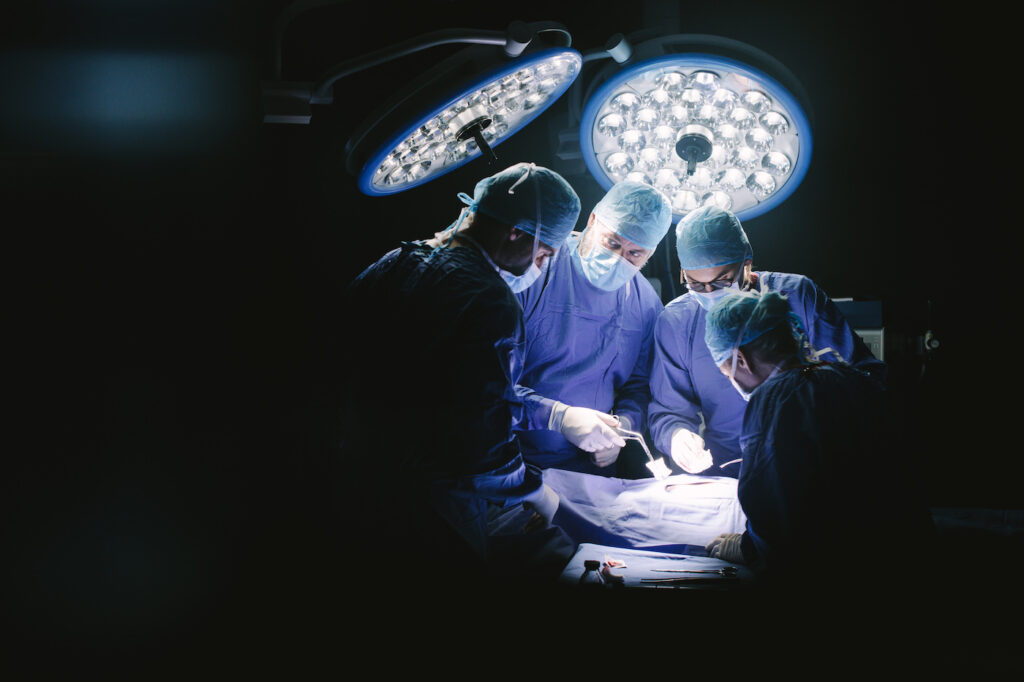I recently turned forty-one. There’s a sort of joke that women don’t tell their age, and if you’re over forty, you’re permanently thirty-nine. But I love telling people how old I am because I wasn’t supposed to make it to twenty-four, let alone forty-one.
When I was twenty-three, I received a double lung transplant due to cystic fibrosis (CF), a life-limiting genetic disease that causes the body’s mucus to be thicker than usual, clogging the linings of the lungs, the pancreas, and other parts of the body. When I was diagnosed in 1993 at age eleven, the average life expectancy of a CF patient was thirty-three years old. At eleven, thirty-three is old. At twenty-three, it’s not.
Receiving a transplant has led me to be incredibly grateful for my life, so grateful that some people think it’s an act. When I appeared on Jeopardy! in 2016, a viewer wrote a tweet asking if I was trying to imitate Carol Channing (because no one could be that insanely enthusiastic). I wasn’t. I really am that enthusiastic and extroverted almost all the time. Part of this enthusiasm stems from knowing that my life, miraculously extended as it is, still will not meet the average life expectancy for an American woman.
My death will most likely come from a side effect of one of the medications I’m on to keep my body from rejecting my transplanted lungs. This makes some recipients resentful or angry, as seen in a recent New York Times op-ed by Amy Silverstein. Silverstein is a dying transplant recipient. In her piece, she rued the state of transplant medicine and called for new developments and treatments.
Start your day with Public Discourse
Sign up and get our daily essays sent straight to your inbox.She and I agree on several points: that we need to focus on reducing the risk of organ rejection; that we need to create drugs that aren’t quite so toxic to our bodies; and that we need to ensure excellence in our transplant centers.
However, I have grave reservations about her assertion that “the sorry state of transplant medicine” has led to her death after thirty-five years and two heart transplants.
Silverstein laments the “pressure to accept what you’ve been given and not dare express a wish, let alone a demand, for a healthier or longer life.” She and I each received the gift of a healthier and longer life when we received our transplants. We weren’t entitled to them. We weren’t guaranteed to get them, and we certainly weren’t guaranteed that we would survive the surgery. The medications that she’s decrying are the ones that have kept her—and me—alive.
She and I each received the gift of a healthier and longer life when we received our transplants. We weren’t entitled to them. We weren’t guaranteed to get them, and we certainly weren’t guaranteed that we would survive the surgery.
These years are an inexpressible gift. Even though gratitude is something that most transplant patients will say they have, I didn’t sense that in Silverstein’s article. I sensed a poisonous anger and a desire to place blame on someone, no matter how it may disguise itself as simply wanting progress and emotional openness.
I expect part of her anger is the overwhelming reality of facing death. It’s a daunting prospect, and it’s easy to get drowned in fear. I’d like to discuss what it’s like to live with a life-limiting disease, and how it’s possible to be happy even in these difficult moments.
The idea of memento mori—remember you will die—has been with me for years, and is the title of my book. Knowing that we’re going to die, how can we use our lives for the best purposes?
A Lazarus Project
Organ transplants allow patients who are in life-limiting situations (sick enough to need a new organ, but healthy enough to survive the surgery and its aftermath), to replace diseased organs with healthy ones, either from a living or a cadaver donor. In 2022, over 48,000 transplants were performed in the United States, bringing the total number of transplants performed in this country to just over 932,000 since 1988.
A transplant only works because of medications that “trick” the immune system into accepting the transplanted organs as its own. This happens by suppressing the immune system so it won’t attack the organ that it needs to survive. However, the side effects of these medications can be quite serious, both in the short and long term, and can lead to diabetes, obesity, high blood pressure, and an increased risk of cancer.
But worrying about side effects of a transplant before you get one is a little bit like worrying about the cabin amenities on the boat that pulls you out of the ocean when you’re drowning. I wasn’t worried about the rescue boat’s qualities; I was worried I wouldn’t get on the boat. I was worried that I’d be dead at age twenty-three.
New Life and Death
I got my life-saving transplant on July 11, 2005, at Nationwide Children’s Hospital in Columbus, Ohio. There really is no other way to describe it other than as a miracle. I have AB+ blood, which is a rare blood type. I was short (I was only 5’2” at the time of transplant) so I needed a small donor. Suzanne, my donor, died in Minnesota, which means for her lungs to get to me in Ohio, there had to be no better match in Minnesota and the entire Midwest. This is because organs don’t last very long outside the body, so they can only be offered to patients living within a certain geographical distance, and you start with the ones closest to home.
The survival of donated organs (the “graft”) and the transplanted patient is a dance between pharmaceutical trickery and side effects. As time passes post-transplant, the medication doses decrease until you’re on an amount that keeps your body from rejecting your organs, but also minimizes harmful side effects.
I’ve been very lucky in that my body seems to like its new lungs. I’m on very low doses of immunosuppressants, which is a positive thing. I’ve greatly enjoyed life post-transplant, and my body likes not almost dying of CF on a regular basis.
Memento Mori
Even though my body has taken well to its new lungs, I still worry about my medication side effects. I went into early menopause, which made me diabetic. My optometrist checks my eyes for cataracts every year, since I’m at a higher risk for those; and since I’m hearing-impaired, my eyes are more important to me than they are to the average bear. I’ve gained a lot of weight. I see a dermatologist for full body skin checks every six months, because skin cancers can be particularly insidious for post-transplant folks, so we must catch them early. Eventually, I’ll probably get cancer, and I’ll either make it out of that, or I won’t.
I know this can sound rather detached. But I was dying eighteen years ago. I met my mortality every night I was on the waiting list, wondering if tomorrow would be the day that I’d die. I wrote a will and planned my funeral.
Post-transplant life allows me the freedom to plan. I can say, with some certainty, that I will be able to go to bed tonight in my own bed and wake up in it tomorrow morning. I can buy ballet season tickets and know I’ll live to the end of the season (or at least have a good certainty I will). But I do know that I’m probably not going to reach sixty, or seventy, or eighty. Transplant has only delayed my death—and I’m grateful it has. But I’m still going to die. So are you.
I’m probably not going to reach sixty, or seventy, or eighty. Transplant has only delayed my death—and I’m grateful it has. But I’m still going to die. So are you.
St. Benedict tells his monks to keep death daily before their eyes. We need to do the same thing, not run away from it, thinking we can play hide and seek with death. We need to keep death daily before our eyes.
How Do I Live?
So knowing this—and knowing it more intimately than most people, I’d imagine—how do I live? How do we live, knowing that even if we’re not transplant recipients, the ride will end, the curtain will fall, and our time will be up?
We live with insane gratitude. For me that looks like being grateful to Suzanne and the medical miracles that make my life possible. It undergirds what I do, feel, and think. No matter how frustrated I might be with my doctors, the hospital parking garage, or the frequent appointments I have, I am still alive. That doesn’t mean that I am happy all the time; I’m not. (No one is.) But it means that even on the bad days, I don’t wish my life away.
I might be mad about rush hour traffic or the Pittsburgh Penguins losing a game, but that doesn’t destroy the bedrock conviction that life is good. (I might need longer to recover after the Penguins lose, but I do recover.)
We spend out. We don’t hoard our time or resources. We invest them in people, in loving others, and in community.
We live with our lives pointed toward God. As a practicing Catholic, I do this by attending Mass, by daily prayer, Eucharistic adoration, and frequent confession. Since my transplant, my spiritual life has deepened tenfold. Some of that is probably due to natural maturation, but it’s also based on the awareness of the first point—that life is a gift, and that God has, for some reason, extended my life. I believe that God is showing His glory through my life (John 9:3), and as such, my life is directed toward praising Him and doing what He’s asked of me. I’m not a saint, and I’m a slower learner, but I’m learning how to do His will.
We spend out. We don’t hoard our time or resources. We invest them in people, in loving others, and in community. I love getting to spread my love of Jane Austen novels to the little girls in my life, being a lector at my local parish, and spending time with my friends and family. I advocate for the dignity of the disabled in all stages of life, and for increased social accommodation of disabilities. Because of how my life has gone—and the fact that CF can be detected in some prenatal testing, and might make some consider terminating their pregnancy—I want to tell people that life is good, even if it is hard. The two aren’t mutually exclusive.
Be grateful. Direct yourself toward God. Spend out. Those are the places we might start, so that when this life is over, we can know that we spent our time here well. Remember you will die—and then get to living.













